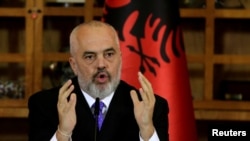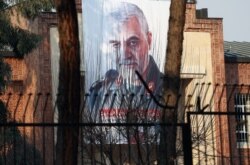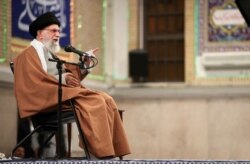Albania said Wednesday it has ordered the expulsion of two Iranian diplomats and declared them "persona non grata."
Acting Foreign Minister Gent Cakaj announced the decision in a Facebook post, writing that diplomats Mohammad Ali Arz Peimanemati and Seyed Ahmad Hosseini Alast have conducted "activities in breach of their [diplomatic] status and the Vienna Convention on Diplomatic Relations."
"The two representatives of the Islamic Republic have been asked to leave the territory of the Republic of Albania immediately," Cakaj wrote, without offering further details.
Confidential sources within the Albanian government told VOA the two diplomats are being expelled for activity endangering Albania's national security.
They said that cultural attache Seyed Ahmed Hosseini Alast had previously held high positions with Iran's Revolutionary Guard and that Mohamed Peimanemati had been a member of the operational unit of Iran's Intelligence Agency, MOIS. The source charged that he was responsible for terrorist acts in European Union countries.
The same sources told VOA that the two had been associates of Quds Force commander Gen. Qassem Soleimani, who was killed in a U.S. airstrike early this month.
Rising tensions
Adrian Shtuni, a foreign policy and security expert in Washington, told VOA the expulsion marks a new low in the already strained diplomatic relationship between Albania and Iran.
"While the specific nature of the actions undertaken by the expelled Iranian diplomats are yet unclear, the justification used by the Albanian authorities, namely 'activities incompatible with their diplomatic status,' is a standard euphemism for espionage," he said.
It is the second time in 13 months that Albania has declared Iranian diplomats "persona non grata."
In December 2018, Tirana expelled Iran's ambassador and another diplomat whom the country accused of "damaging its national security." Following talks with other countries, including Israel, AIbania declared the two diplomats were expelled for "violating their diplomatic status."
U.S. President Donald Trump subsequently thanked Albania, saying in a letter to Prime Minister Edi Rama that the action "exemplifies our joint efforts to show the Iranian government that its terrorist activities in Europe and around the world will have severe consequences."
Reaction from Iran
Iran blamed the United States and Israel for the expulsions. Its foreign ministry said Albania "has become an unintentional victim of the United States, Israel and some terrorist groups."
Iran's supreme leader, Ayatollah Ali Khamenei, seemed to target Albania in a televised address last week decrying the killing of Soleimani. He spoke of a "small and sinister" country that he claimed "was instrumental in a Western plot to effect violent unrest" in Iran in November. Mass protests swept Iran at that time following an abrupt increase in gasoline prices.
Albanian President Ilir Meta responded with a statement saying Albania "is not an evil country, but a democratic country that has suffered from an evil dictatorship unparalleled in its kind. [It] therefore considers human rights sacred." Albanian dictator Enver Hoxha ruled for 40 years years before his death in 1985.
Iranian hostility toward Albania stems in part from the Balkan country's decision to provide a refuge for 2,500 members of the People's Mujahedin of Iran (Mojahedin-e Khalq or MEK), a militant Iranian opposition group regarded as terrorists by Tehran. The group was expelled from Iraq following the overthrow of Saddam Hussein.
Maryam Rajavi, president-elect of MEK's political arm, the National Council of Resistance of iran, tweeted Wednesday, saying, "The government of Albania's expulsion of two of the Iranian regime's diplomats is a courageous and admirable measure in fighting terrorism and ensuring security of the people of #Albania and Iranian refugees."
The U.S. has assisted Albania in its efforts to resettle the MEK, which has supported the U.S. in military operations in the Middle East.
Albanian police disclosed for the first time late last year that they had thwarted a 2018 plot involving a "terrorist cell" of Iran's elite Quds Force. They said the group was targeting a gathering in Albania that included MEK members.
Three Iranian men and one Turkish man were suspected of involvement in the cell.






